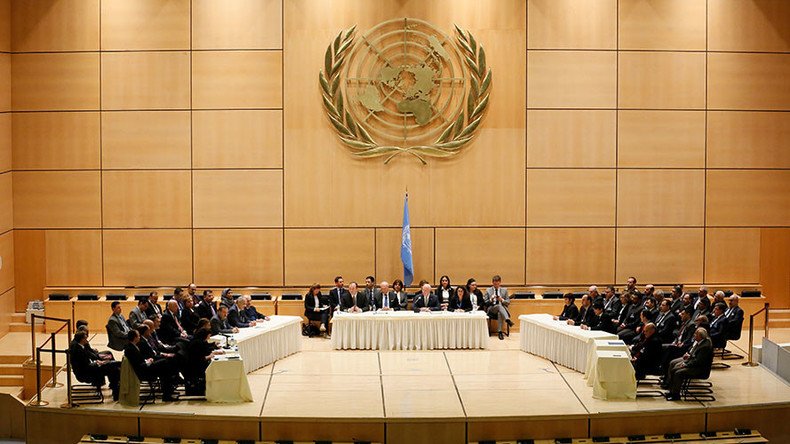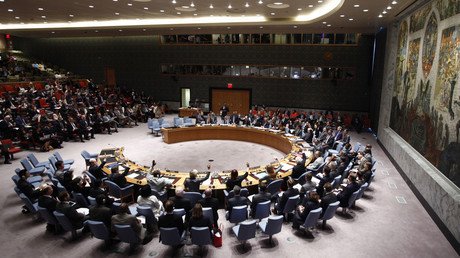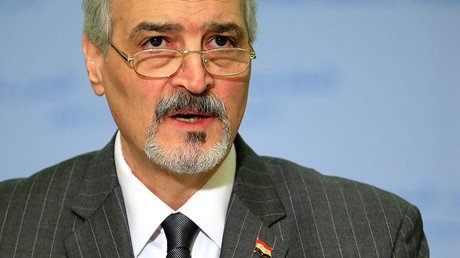Geneva talks ‘outlined the way forward’ for Syrian settlement – Russian envoy

The latest round of intra-Syrian talks "outlined" the way forward for the settlement of the conflict, Aleksey Borodavkin, the Russian envoy to UN Office in Geneva has said, urging the parties to be more constructive and ready for compromise.
Despite no breakthrough, Borodavkin noticed “certain progress” in the negotiations between the Syrian government and three opposition groups after the latest round of talks concluded on Friday.
“Warnings of ill-wishers, who predicted a failure of the Geneva round and the ensuing breakdown of the Syrian ceasefire – nothing of this came true,” he said. “The way forward has been outlined. Everything depends now on the degree of constructiveness in all parties to the talks,” the envoy added.
According to Borodavkin, the Syrian government acted professionally during the negotiations, showing determination to achieve a positive result.
As for the opposition, the Saudi-backed High Negotiations Committee (HNC) group was less constructive as it “has not withdrawn yet its whimsical demand that [Syrian] President Bashar Assad should resign before the beginning of the talks” and made unrealistic remarks regarding the country’s’ future constitution, he said.
The Russian envoy pointed that the opposition hasn’t yet fully distanced itself from terror groups like Islamic State (IS, formerly ISIS/ISIL) and Jabhat al-Nusra who were not part of talks.
“We expect this [separation] to happen soon,” the member of the Russian delegation said, who was present throughout the entire ten-day talks in Geneva as an observer.
Moscow also regrets that the Kurds, the so-called Astana platform, and other moderate groups weren’t present in Geneva, which prevented full opposition representation in Geneva.
On Friday, UN special envoy for Syria, Staffan De Mistura, who invited the sides to Geneva, said the government and opposition have agreed to continue the search for a political solution to the six-year conflict.
The two sides only convened for the opening ceremony though, with the rest of the negotiations conducted through De Mistura, who talked to the government and opposition in separate sessions.
“The train is ready, is at the station, is warming up its engine, everything is ready and it just needs an accelerator. And the accelerator is in the hands of those who were attending this round," the UN envoy told journalists.
During the talks, counter-terrorist efforts were added as a “fourth basket” in addition to attempts aimed at establishing a “credible, inclusive government”, drafting of a new constitution and the holding free and fair elections, he said.
There are still “people in Syria and outside who still believe there is a military option or a military,” De Mistura warned, but called such ideas “a fantasy,” confirming the UN’s commitment to finding a peaceful solution to the conflict which has been raging since March 2011, claiming hundreds of thousands of lives in the process.
According to De Mistura, the intra-Syrian talks will continue in Geneva later in March. Russian officials said the starting date for the next round of negations was March 20. However, before that, the Syrian warring parties will again meet in Astana, Kazakhstan on March 14, the platform where a nation-wide ceasefire was agreed in December.
Syria's chief negotiator in Geneva, Bashar Jaafari, said together with the opposition, the agenda was agreed in Switzerland, lamenting that is the “only thing” that was achieved.
He welcomed the injection of counter-terrorism measures into the talks, saying it's as equally important as the other issues being discussed. Jaafari emphasized though, that the Syrian government would prefer to talk to a unified opposition, instead of separate groups.
READ MORE: New round of Syria talks kicks off in Geneva on back of Astana progress
“De Mistura's mistake was that he did not join several opposition groups into one. We need a national partner, not a Qatari, Saudi, French or Turkish one," he said.
The opposition’s lead negotiator, Nasr al-Hariri, also said the fresh Geneva round weren’t in vain. "Although we are closing this round without clear results ... I can say this time was more positive," the HNC head said.














